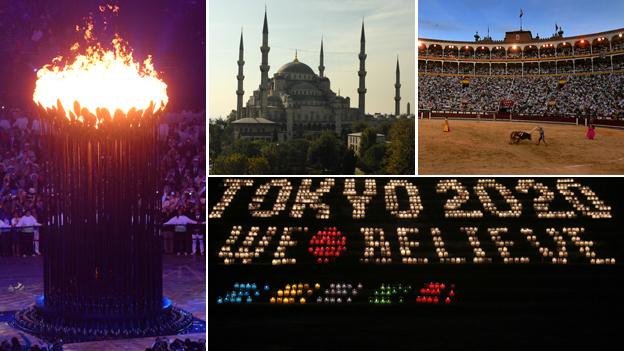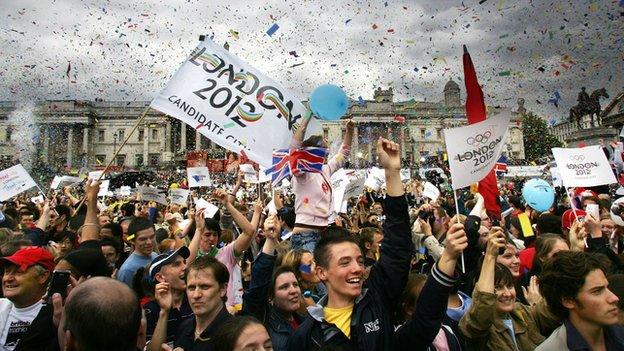Olympics: How Madrid has edged ahead in 2020 host city vote
- Published
- comments

Detroit, the home of Motown, the late novelist and screenwriter Elmore Leonard and the largest municipal bankruptcy in US history, bid to stage the Olympics seven times between 1939 and 1966.
Demonstrating Olympian levels of bouncebackability, the city picked itself up after each rejection and came back for more four years later. It only gave up when years of rising unemployment and racial tension resulted in an image-defining riot in 1967; the depressing march to financial ruin in 2013 had started.
A cynic might suggest that hosting one of the International Olympic Committee's (IOC) four-yearly orgies of spending on transport, security and venues would have emptied Detroit's coffers even sooner, but that is not a view you hear so often in these post-London 2012 days.
Memories of Montreal needing an emergency tobacco tax to plug its losses, or the sight of weeds growing on Athens' new baseball stadium, have been replaced with images of beaming broadcasters, smiling sponsors and the Queen parachuting into the opening ceremony.
The Games have regained their swagger, and high-powered persuaders from Istanbul, Madrid and Tokyo descend on Buenos Aires this week to ask the IOC's notoriously contrary electorate to give them the 2020 Olympics and Paralympics.
All three have been here before. Istanbul fell at this hurdle in 2000 and 2008, the Spanish capital went close in 2005 and 2009, and Japan's megacity actually hosted the 1964 Games before failing in a bid for 2016.
The prospect of a first Games in a Muslim country, at the historic frontier between Europe and Asia, was enough to make Istanbul an early front-runner, but nobody is talking about favourites in the 7 September vote now.
"I have never seen a race like it," said Robert Livingstone, the Olympic historian and journalist behind the respected GamesBids.com website., external
"All of the cities have compelling stories, but nobody stands out. It's a complete toss-up."
Istanbul's bid encapsulates Livingstone's "pros and cons" point perfectly.
Its novelty is a big draw, as is its beguiling backdrops, surging economy and young population, but then riot police piled into Taksim Square with rubber bullets, tear gas and water cannons in June and everybody wondered just how stable the country was, particularly with Iran, Iraq and Syria on the doorstep.
Throw in concerns about Istanbul's transport system and some doping-related bad publicity before the World Athletics Championships,, external and you would normally have enough to rule this bid out of contention. The fact that nobody is willing to do that says much about the race, if that is the right description of a contest that could see the winning bid holding on for dear life while its rivals go backwards.
The bookmakers' favourite is Tokyo. It also enjoys a narrow lead in the Around the Rings Olympic Bid Power Index, external, and Livingstone's BidIndex, external, two mathematical models that rank the merits of each bid. But these encouraging signs come with caveats.
Tokyo has sound finances, good organisation and the most compact bid in terms of venues, but its campaign has seemed a little underwhelming at times, which is possibly related to concerns about the home front.
The IOC is all too aware that some will always think the Games are an extravagance, which is why it likes to ensure domestic approval ratings are as high as possible at the outset.
As of a year ago, Tokyo's numbers were terrible. It has since turned that around and the latest figures show support for the Games is now at about 90%, but first impressions can stick.
As can the most recent story an IOC member has read about a country. Tokyo's bid leader Tsunekazu Takeda has spent most of the last month assuring people that the Fukushima nuclear leak is under control.
Speaking in Buenos Aires on Wednesday, Takeda said: "The radiation level is absolutely safe. The 35 million people in Tokyo are living in normal conditions. There is no problem.
"Not one person in Tokyo has been affected. Tokyo and Fukushima are almost 250km apart."
Takeda is probably right, and 2020 is seven years away, but as Around the Rings' founder Ed Hula puts it, he is wrong to say it is not an issue.
"It is a risk factor the IOC has glossed over until now," said Hula.
"But if something untoward was to happen, people won't want to go. That's a problem."
Which leaves Madrid.
Experienced at staging major events, and with plenty of goodwill from the European-heavy IOC membership, the Spanish bid is the one that requires the least imagination because 80% of its venues are built. This also makes it the cheapest bid.

Wild celebrations took place in Trafalgar Square after London was selected as host city in 2005
That's a good thing, right?
"Not necessarily," said Livingstone. "The IOC doesn't like cheap; it likes monuments to the Olympic movement."
Madrid's no-frills budget also draws attention to its Achilles heel, Spain's arthritic economy.
"I'm not sure how IOC members will feel about giving the Games to a country in recession and with youth unemployment figures that bad," said Hula.
Madrid's bid, to its credit, has tried to face this front on, putting up experts to assure voters that the economy's long-term prospects are not so bad, its budget is credible and Games can be staged in a downturn, as London proved.
Livingstone thinks these arguments, and its friends in the electorate, should be enough to see Madrid avoid getting knocked out in the first round of voting. After that the game changes significantly.
One seasoned IOC campaigner, who helped London beat Madrid in 2005,, external said: "You don't win a vote like this with your friends; you win with people who didn't like you at first."
Recalling that dramatic vote in Singapore, the source added: "If it was London versus Madrid in the final round, we would have lost. But when it was us versus Paris, we picked up more third and fourth-choice votes than they did."
Duncan Mackay, the editor of insidethegames.biz,, external remembers it well.
"London feared Madrid, but London was better at reaching beyond its core support," said Mackay.
"I think Madrid has learned that lesson and you cannot underestimate the impact a charismatic 'star turn' can make. They've got Crown Prince Felipe. He carried Spain's flag at the 1992 Olympics in Barcelona. IOC members will be impressed."
It is this all-important X-factor that makes Madrid a marginal favourite with both Hula and Mackay, while Livingstone thinks it is too close to call, beyond his prediction that Madrid will make the winner-takes-all second round of voting.
There is, however, another variable.
As well as choosing a city to host the 2020 Games, the 125th IOC session is selecting a sport to add to the programme in 2020 and a new president, and it is the latter choice that appears to be causing the most excitement among the membership.
Given that they have only had this choice twice in the last 33 years, you can hardly blame them. The almost dictatorial powers invested in the president also make this selection one you really want to ponder.
Unlike the city vote, there is a clear front-runner - Germany's Thomas Bach, a former Olympic fencer who has spent the last seven years as an IOC vice-president.
But a vote for him would be another vote for Europe, which could hinder Madrid's chances.
Alternatively, a vote for the man most see as his strongest rival, Ng Ser Miang of Singapore, could bring about a first Asian boss at the IOC, making Tokyo's hopes of following a 2018 Winter Olympics in Pyeongchang, South Korea, very unlikely.
So there is still much to be decided, many hands to be shaken and promises to be whispered.
And the prize will make all the miles travelled and money spent worthwhile: a chance to show that your city can stage the greatest show on earth, a chance Detroit never got, and probably never will.
- Published6 September 2013
- Published7 September 2013
- Published19 February 2013
- Published7 January 2013
- Published24 May 2012
- Published2 September 2011